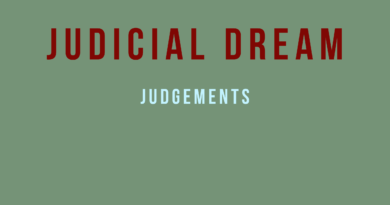SEC 319 CRPC
Ramesh Chandra Srivastava vs. State of UP, SC 2021
FACTS – An FIR was lodged by the second respondent. It was alleged in the FIR that her husband(deceased) told her that he is leaving for work to meet the appellant. There is, in fact, no dispute that the deceased was the driver of the appellant. In the FIR, it is also stated that at 2 p.m., he called and informed the second respondent-his wife that he is going to Gola and shall return by evening. It is thereafter her case that her husband’s phone was switched off and an unidentified dead body was found. The second respondent reported that the murder of her husband was committed by his employer (the appellant before us) with the help of his friends.
Thereafter, the police investigated the matter and chargesheet was filed against three persons. Thereafter, the second respondent deposed. In her evidence, that she is fully confident that her husband was murdered by the appellant.
On the very same day, an application was filed on behalf of the prosecution invoking Section 319 Cr.P.C. The Sessions Judge, Khiri, took the view that the power under Section 319 Cr.P.C. has to be invoked and ordered to summon the appellant. This order came to be unsuccessfully challenged before the High Court.
CAUSE – Summons issued under Section 319 of Cr.P.C. has brought the newly summoned person to the Supreme Court challenging it.
ARGUMENTS – Learned counsel for the appellant pointed out that the courts have erred in law in invoking power under Section 319 Cr.P.C. solely based on the deposition given by the second respondent.
Learned counsel for the respondents, pointed out that the deposition of the second respondent as given by her, would suffice in law for the Court to invoke the power under Section 319 Cr.P.C.
ISSUE – What are the standards which have been fixed by the Supreme Court for invoking the power under Section 319 Cr.P.C.
DECISION – The Supreme Court observed that while it approves of relying upon deposition which has not suffered cross examination for the purpose of invoking Section 319 Cr.P.C., it was relevant to note the standards which have been fixed by the Court for invoking the power under Section 319 Cr.P.C. The statement of law in this regard was contained in paragraphs 105 and 106 of Hardeep Singh v. State of Punjab and Others (2014) 3 SCC 92:
105. Power under Section 319 Cr.P.C. is a discretionary and an extraordinary power. It is to be exercised sparingly and only in those cases where the circumstances of the case so warrant. It is not to be exercised because the Magistrate or the Sessions Judge is of the opinion that some other person may also be guilty of committing that offence. Only where strong and cogent evidence occurs against a person from the evidence led before the court that such power should be exercised and not in a casual and cavalier manner.
106. Thus, we hold that though only a prima facie case is to be established from the evidence led before the court, not necessarily tested on the anvil of cross-examination, it requires much stronger evidence than mere probability of his complicity. The test that has to be applied is one which is more than prima facie case as exercised at the time of framing of charge, but short of satisfaction to an extent that the evidence, if goes unrebutted, would lead to conviction. In the absence of such satisfaction, the court should refrain from exercising power under Section 319 Cr.P.C. In Section 319 Cr.P.C. the purpose of providing if ‘it appears from the evidence that any person not being the accused has committed any offence’ is clear from the words “for which such person could be tried together with the accused.” The words used are not ‘for which such person could be convicted’. There is, therefore, no scope for the court acting under Section 319 Cr.P.C. to form any opinion as to the guilt of the accused.”
The Supreme Court held that the test as laid down by the Constitution Bench of the Court for invoking power under Section 319 Cr.P.C. inter alia included the principle that only when strong and cogent evidence occured against a person from the evidence the power under Section 319 Cr.P.C. should be exercised. The power could not be exercised in a casual and cavalier manner. The test to be applied, as laid down by this Court, is one which is more than prima facie case which is applied at the time of framing of charges. It would all depend upon the evidence which is tendered in a given case as to whether there is a strong ground within the meaning of paragraph 105.
Thus the Court directed the Sessions Judge, Khiri, to consider the matter afresh in the light of the principles which have been clearly enunciated by the Apex Court. The appeal was accordingly allowed. The impugned judgment was set aside and the Supreme Court also set aside the order passed by the learned Sessions Judge issuing summons.


